- News
- Reviews
- Bikes
- Components
- Bar tape & grips
- Bottom brackets
- Brake & gear cables
- Brake & STI levers
- Brake pads & spares
- Brakes
- Cassettes & freewheels
- Chains
- Chainsets & chainrings
- Derailleurs - front
- Derailleurs - rear
- Forks
- Gear levers & shifters
- Groupsets
- Handlebars & extensions
- Headsets
- Hubs
- Inner tubes
- Pedals
- Quick releases & skewers
- Saddles
- Seatposts
- Stems
- Wheels
- Tyres
- Tubeless valves
- Accessories
- Accessories - misc
- Computer mounts
- Bags
- Bar ends
- Bike bags & cases
- Bottle cages
- Bottles
- Cameras
- Car racks
- Child seats
- Computers
- Glasses
- GPS units
- Helmets
- Lights - front
- Lights - rear
- Lights - sets
- Locks
- Mirrors
- Mudguards
- Racks
- Pumps & CO2 inflators
- Puncture kits
- Reflectives
- Smart watches
- Stands and racks
- Trailers
- Clothing
- Health, fitness and nutrition
- Tools and workshop
- Miscellaneous
- Buyers Guides
- Features
- Forum
- Recommends
- Podcast
review
£1,199.99
VERDICT:
No-fuss machine for commuting, touring, leisurely outings and more – a bike that just lets you enjoy your ride
Weight:
14,330g
Contact:
At road.cc every product is thoroughly tested for as long as it takes to get a proper insight into how well it works. Our reviewers are experienced cyclists that we trust to be objective. While we strive to ensure that opinions expressed are backed up by facts, reviews are by their nature an informed opinion, not a definitive verdict. We don't intentionally try to break anything (except locks) but we do try to look for weak points in any design. The overall score is not just an average of the other scores: it reflects both a product's function and value – with value determined by how a product compares with items of similar spec, quality, and price.
What the road.cc scores meanGood scores are more common than bad, because fortunately good products are more common than bad.
- Exceptional
- Excellent
- Very Good
- Good
- Quite good
- Average
- Not so good
- Poor
- Bad
- Appalling
The Genesis Tour de Fer is a do-it-all tourer that could, arguably, do any riding that you need of it. It might not be the most lush or lustrous of rides, but it's a bike that will do whatever you want with the minimum of fuss and without complaint.
- Pros: Do-it-all bike, neutral handling, comes fully equipped and ready for adventure
- Cons: Brakes lack power, not the best value for money
You're graced with reliable steel tubing, nigh-on puncture-proof Schwalbe tyres, Shimano gearing, disc brakes and a full complement of touring gear that includes mudguards, a rear rack, three bottle cages and even some spare spokes in a neat holder on the seatstays.
Is this the only bike you'll ever need?
> Find your nearest dealer here
Ride and handling
Let's set things straight, this bike isn't likely to set your world on fire. It's a solid, stately tourer that is designed to get you from A to B, perhaps not fast but reliably so. Throw away any expectations of high performance in terms of speed and you can look at this bike in a different light.
The handling is predictable, never throwing up any surprises, and remains consistent whether riding loaded or not. I've ridden faster and more exciting bikes, but the Tour de Fer isn't designed to be either of those: it's a solid package that will roll you anywhere; a stately steamer with neutral handling – unashamedly average, if you like, though that sounds a little derogatory. It's not meant to be: for a bike like this that's what you want.
That neutral handling is present both loaded and unloaded. Ride it unloaded and you can do so in a leisurely fashion. Load it up with luggage and it maintains its composure and stability very obediently.
More than that, though, as often seems to be the case with touring bikes it seems to ride better with luggage. Having it loaded up seems to leave the bike feeling a little more planted around corners and creates, possibly because of the added weight, what I would describe as a little more "spring" in the tubing.
Unloaded, that neutral handling can feel a little meandering and vague, which isn't great for quick descents or tight corners where accurate handling is a must. That changes with luggage, where the bike feels much more capable of carving around corners, although the limiting factor is undoubtedly the tyres, which, while durable, are not particularly grippy.
This, too, has to be looked at in context. The Tour de Fer 10 isn't designed to be a high-performance racer; it favours a calm ride with handling that is forgiving of mistakes. What might, elsewhere, be described as slow and unresponsive, in this case allows you to (metaphorically) sit back and enjoy the ride.
On descents you'll want to take it easy anyway, with the brakes a little lacking in power. That means you'll have to judge your stopping distances carefully and take care not to come into corners too fast.
Again, though, for the riding this bike is designed for that's not likely to be a problem. You're unlikely to be winning competitions on the Tour de Fer; it's for cruising along, and it does that well. It's a refreshingly down to earth bike you can ride without too much thought.
Frame and equipment
The steel frame is Genesis' own Mjölnir double butted 4130, which provides a comfortable ride. I was actually surprised at how cosseted my rear end felt.
The design of the frame is elevated by details like the embossed iron cross on the top tube, and the pump peg on the head tube to allow a frame pump to be fitted easily. I've always liked the brass cable adjusters Genesis uses, too.
Schwalbe Marathon tyres almost have cult status as THE touring tyre, but I wouldn't say they are the most confidence-inspiring in terms of grip. They compensate nicely with durability and puncture resistance, though. My preference would be for something with a slicker tread for better rolling performance on the road, as well as something a little grippier. That's exacerbated in the wet, where the tyres end up feeling very greasy and leave you having to roll along tentatively.
Having the pronounced tread featured here seems superfluous, providing very little tangible benefit for the riding this bike might encounter.
> What width tyres are best for you?
The 35mm volume of the tyres isn't the largest, and it would be nice to have a bit more cushioning to further improve the bike's versatility. Obviously, with mudguards fitted there's always going to be a little less space but there are plenty of bikes out there able to fit large rubber and mudguards.
While the Shimano Sora drivetrain is undoubtedly budget fare, it still provides reliable shifting. It's quite gratifying returning to lower-end components and realising how well they actually work. Yes, they may not have the refinement and desirability of higher-end groupsets but they still work very, very well.
The triple chainset may seem a little quaint nowadays, but its 50/39/30-tooth rings paired with an 11-32t cassette provide the extra range you need when loaded up. It provides enough flexibility to grind your way up the steepest of hills and avoid spinning out when you cruise your way down again.
The Promax mechanical disc brakes leave a lot to be desired. Sadly, that's just a feature inherent to mechanical disc brakes generally. It does, as I said earlier, mean you'll have to take it easy (and even more so when loaded up) and be aware of your stopping distances.
Hydraulic brakes are out of the question at this price point, but I can't help feeling that budget rim brakes would likely outperform these so-called stoppers. That's the only real sticking point on a bike that is otherwise so well equipped.
You even get a full complement of mudguards that turn this into a full-on utility machine. For anything that is going to be vaguely useful in anything other than the best weather, they are indispensable.
In fact this bike comes 'touring/adventure ready', with three bottle cages and a rear rack mounted from the factory. It's a pity not to have a front rack too (I prefer loading up bikes at the front as I feel it leads to better weight distribution), but the one fitted is a quality Tubus item.
All you'll need to add are some panniers and bottles and you're good to go.
Value
At the price, it's nice to get all the equipment you do, but sadly Genesis doesn't seem to represent quite the value that it once did.
An obvious competitor is the Trek 520. That comes in at £100 cheaper yet has a front rack, high volume tyres, more upscale brakes and slightly better drivetrain components.
> Why your next bike should be a touring bike
Likely the decision about this bike will depend on which exact features you feel you need. Buying a complete build like this means you want something ready out of the box, and the deciding factor will be which particular set of features you require for your purposes.
Conclusion
This bike is thoroughly traditional in its outlook, and that's by no means a bad thing, though you should consider just what you need the bike for.
If you want something with all the latest standards that fits into a modern lineup you should probably look somewhere else. If you want an all-purpose machine that comes with all the gubbins you might ever fit or need, then it could be just the bike for you.
And that sums the Tour de Fer up quite well. It's a bike that will be ready when you are, that won't question the abuse you throw at it and that will stick with you reliably day in and day out.
It won't have sensibilities about weather or surfaces or complain about being burdened by luggage. It will just bravely soldier on and support you in whatever cycling goals you have.
If you'll allow me to wax lyrical for a sentence or two. This is a bike's bike – a bike that's true to the spirit of what cycling is about. Sure, there are bikes out there that may be more glitzy or more refined, but it's a bike that is honest about what it is.
Verdict
No-fuss machine for commuting, touring, leisurely outings and more – a bike that just lets you enjoy your ride
road.cc test report
Make and model: Genesis Tour de Fer 10
Size tested: Medium
About the bike
List the components used to build up the bike.
FRAME: GENESIS MJOLNIR SEAMLESS DOUBLE-BUTTED CROMOLY
FORK: CR-MO UNICROWN DISC
HEADSET: PRESTINE PT-1606 1-1/8" SEMI CARTRIDGE
SHIFTERS: SHIMANO SORA ST-R3030 / 3X9 SPEED
REAR DERAILLEUR: SHIMANO SORA RD-R3000 / GS CAGE
FRONT DERAILLEUR: SHIMANO SORA FD-R3030
CHAINSET: SHIMANO FC-R453 / 50-39-30T / XS, 165MM / S, 170MM / M-XL, 175MM
BOTTOM BRACKET: SHIMANO BB-ES300 68-121MM
CASSETTE: SHIMANO CS-HG300-9 / 11-32T
RIMS: JALCO DD24 / 36H
HUBS: KT K08F/K08R 36H / FRONT / REAR / 6-BOLT
SPOKES: STAINLESS STEEL 14G
TYRES: SCHWALBE MARATHON MONDIAL 700X35C
BRAKES: PROMAX DSK-717 DISC BRAKES W/ 160MM ROTORS
BRAKE LEVERS: SHIMANO SORA ST-R3030
HANDLEBAR: GENESIS X-RACE PRO / 16DEG FLARE / XS, 400MM / S-M, 420MM / L-XL, 440MM
GRIP TAPE: VELO TAPE W/GEL
STEM: GENESIS AS-027 / + - 7DEG / 100MM
SADDLE: GENESIS ROAD COMFORT
PEDALS: NW-99K W/ TOECLIP
SIZES: XS S M L XL
CHAIN: KMC X9
Tell us what the bike is for and who it's aimed at. What do the manufacturers say about it? How does that compare to your own feelings about the bike?
Genesis says, 'The Tour de Fer 10 represents our vision of affordable escapism. A bike designed for the sole purpose of carrying rider and luggage long distances efficiently and in comfort, without leaving a sizeable dent in your pocket. We put it together as affordably as possible without cutting corners that would've been detrimental to the ride or long-term ownership. This meant choosing rugged, reliable kit that will last the high mileage for which we intend the bike to be used. Most of what makes it so good for touring is also 100% applicable to commuting. Everyday practicalities like large volume, puncture resistant Schwalbe Marathon tyres, tough 36H wheelset, powerful, controlled disc brakes, Tubus Cargo rear rack and custom length and extra-long Chromoplastic mudguards. Tour de Fer 10 is just as suited as a daily commuter as it is a cross-continent tourer.'
Where does this model sit in the range? Tell us briefly about the cheaper options and the more expensive options
This is the entry-level model. The more expensive models come similarly equipped, though with higher-end gears and dynamo lighting.
Frame and fork
Overall rating for frame and fork
7/10
Tell us about the build quality and finish of the frame and fork?
Nice paint job, neat welds and detailing. Barrel adjusters were a little stiff.
Tell us about the materials used in the frame and fork?
Steel (Genesis Mjölnir Chromoly)
Tell us about the geometry of the frame and fork?
Relatively slack for stable handling when loaded.
How was the bike in terms of height and reach? How did it compare to other bikes of the same stated size?
No surprises here.
Riding the bike
Was the bike comfortable to ride? Tell us how you felt about the ride quality.
Comfortable and relaxed position, though I don't get on with Genesis saddles.
Did the bike feel stiff in the right places? Did any part of the bike feel too stiff or too flexible?
It has the flex you'd expect of a steel frame, which adds comfort.
How did the bike transfer power? Did it feel efficient?
It's a heavy bike and is not built for sprinting. Once up to speed it rolls happily along.
Was there any toe-clip overlap with the front wheel? If so was it a problem?
No.
How would you describe the steering? Was it lively neutral or unresponsive? Neutral.
Tell us some more about the handling. How did the bike feel overall? Did it do particular things well or badly?
It's a heavy bike, but rolls along happily with predictable and reliable handling.
Which components had the most effect (good or bad) on the bike's comfort? would you recommend any changes?
I didn't get on with the saddle.
Which components had the most effect (good or bad) on the bike's stiffness? would you recommend any changes?
Not really relevant for a bike like this.
Which components had the most effect (good or bad) on the bike's efficiency? would you recommend any changes?
It's nice to have a triple chainset for churning up steep hills when fully loaded.
Rate the bike for efficiency of power transfer:
5/10
Rate the bike for acceleration:
5/10
Rate the bike for sprinting:
5/10
Rate the bike for high speed stability:
7/10
Rate the bike for cruising speed stability:
8/10
Rate the bike for low speed stability:
7/10
Rate the bike for flat cornering:
7/10
Rate the bike for cornering on descents:
7/10
Rate the bike for climbing:
5/10
The drivetrain
Rate the drivetrain for performance:
8/10
Rate the drivetrain for durability:
8/10
Rate the drivetrain for weight:
6/10
Rate the drivetrain for value:
8/10
Tell us some more about the drivetrain. Anything you particularly did or didn't like? Any components which didn't work well together?
Basic groupsets just work so well nowadays.
Wheels and tyres
Rate the wheels for performance:
6/10
Rate the wheels for durability:
8/10
Rate the wheels for weight:
6/10
Rate the wheels for comfort:
7/10
Rate the wheels for value:
6/10
Tell us some more about the wheels.Did they work well in the conditions you encountered? Would you change the wheels? If so what for?
Standard fare wheels, built up with 36 spokes for a sturdiness that will withstand a lot of load and abuse.
Rate the tyres for performance:
6/10
Rate the tyres for durability:
9/10
Rate the tyres for weight:
6/10
Rate the tyres for comfort:
6/10
Controls
Rate the controls for performance:
7/10
Rate the controls for comfort:
7/10
Tell us some more about the controls. Any particularly good or bad components? How would the controls work for larger or smaller riders?
A decent and reliable spec. Middle of the road and likely a good compromise for everyone.
Anything else you want to say about the componentry? Comment on any other components (good or bad)
I didn't get on well with the mechanical disc brakes, which provided very limited stopping power.
Your summary
Did you enjoy riding the bike? Yes, more than I expected.
Would you consider buying the bike? Not for my use case.
Would you recommend the bike to a friend? If they're looking for a fit and forget solution to do everything with.
Rate the bike overall for performance:
7/10
Rate the bike overall for value:
7/10
Use this box to explain your overall score
It's a good bike for the thing it's designed to do: load it up, carry everything you need and take it on an adventure.
About the tester
Age: 26
I usually ride: My best bike is:
I've been riding for: 5-10 years I ride: A few times a week I would class myself as: Experienced
I regularly do the following types of riding: road racing, commuting, touring, general fitness riding, fixed/singlespeed, mountain biking
Latest Comments
- Velophaart_95 38 min 1 sec ago
It might not be popular, but in some respects he's right; how can you have a sporting event, with no winners for 7 consecutive years? In virtually...
- cyclisto 42 min 59 sec ago
This is true too! Maybe I had got used to Carrera brand name as a bicycle brand, forgetting the fancy 4 wheeler with the same name.
- philhubbard 1 hour 28 sec ago
Guessing you made it out to the Taipei show this year then!
- Secret_squirrel 1 hour 2 min ago
Yet you clearly do need perspective - its all over your response. It tells you that 40 cars passed you safely but yet you've been triggered by...
- mdavidford 1 hour 10 min ago
I can't imagine carrying that Lion of Flanders flag round with him helped Van der Poel much either.
- Hirsute 1 hour 22 min ago
I'd find a physio who would have a look. They will do tests to determine where the issue lies, the extent of mobility and maybe some exercises....
- Miller 1 hour 28 min ago
An uh-oh email signifying that it took Tadej Pogacar to dethrone you, that's pretty impressive. You'd want to keep that email.
- Rendel Harris 1 hour 44 min ago
I wouldn't mind, but I would like the caveat that it should come after I've enjoyed at least one post-ride pint of beer. Sure many others have...
- Backladder 1 hour 49 min ago
It was a bit of a tongue in cheek suggestion
- chrisonabike 2 hours 48 min ago
The thing we're envious of over here in the UK is ... any largely motor vehicle-free area (still not normal for UK). Never mind one with formal...










































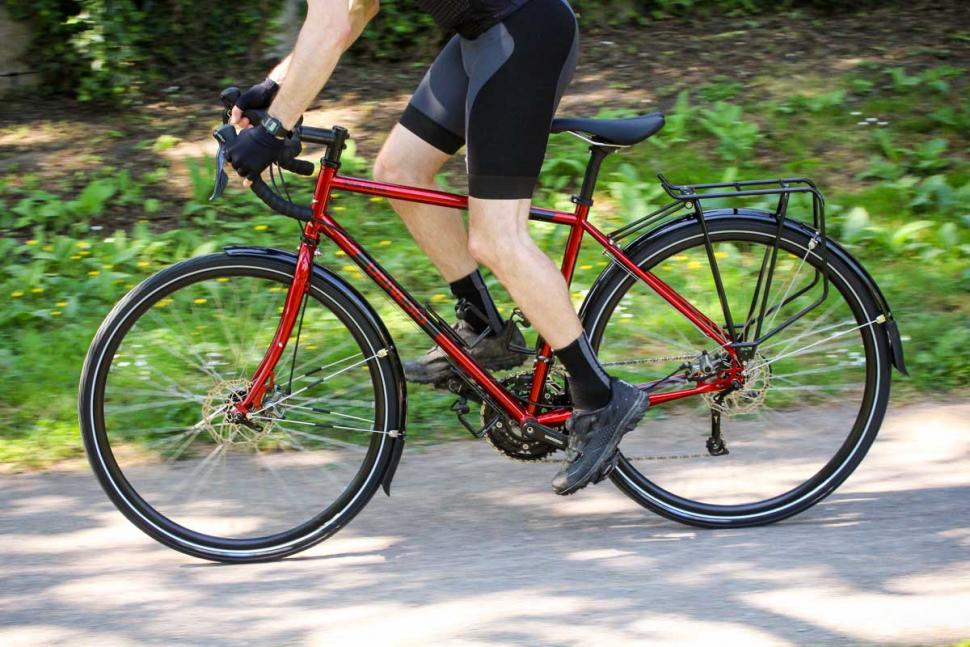
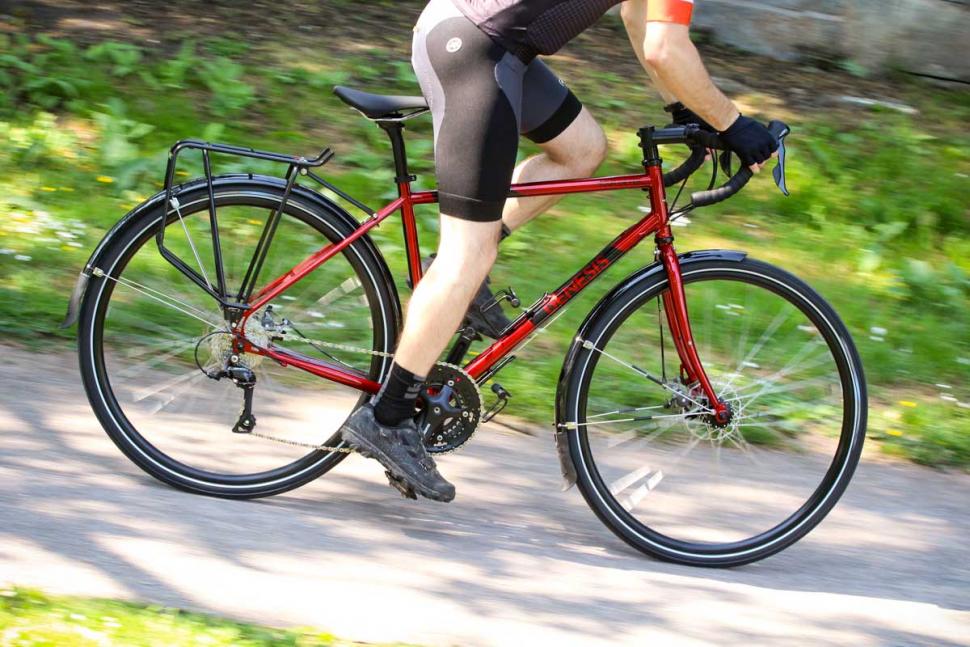
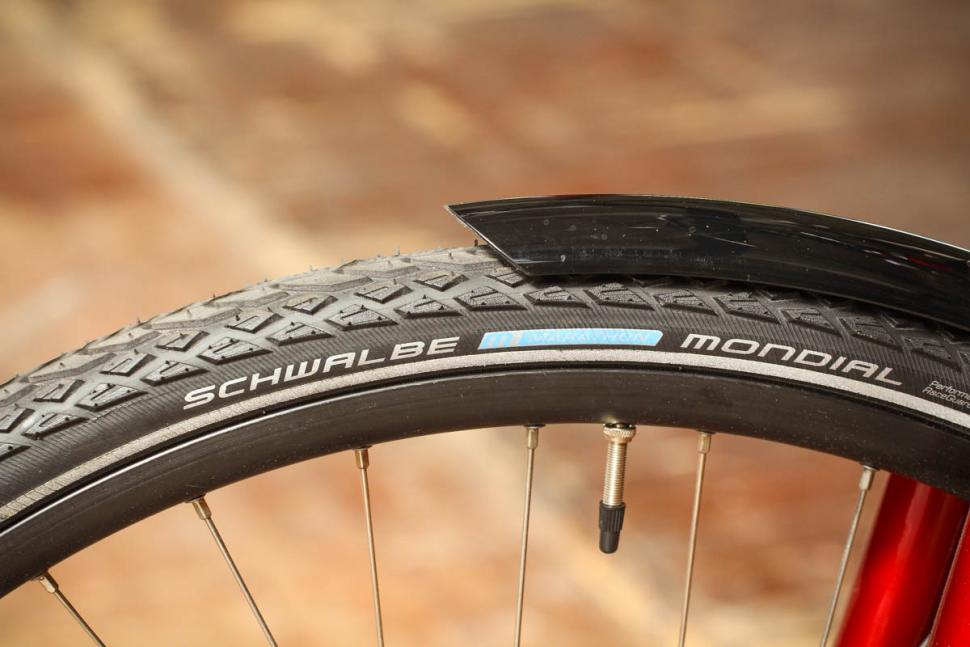
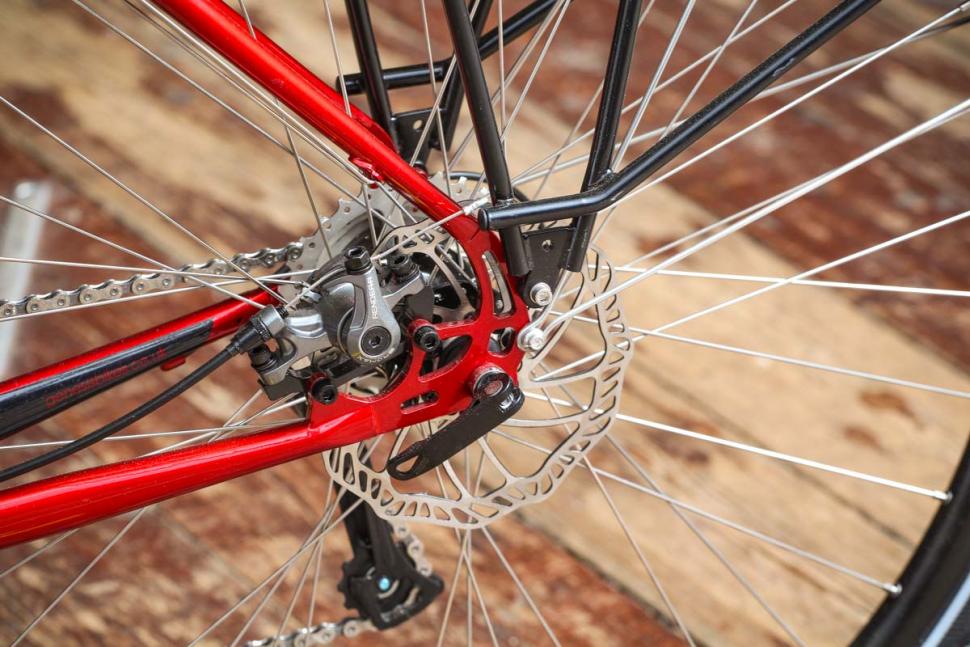
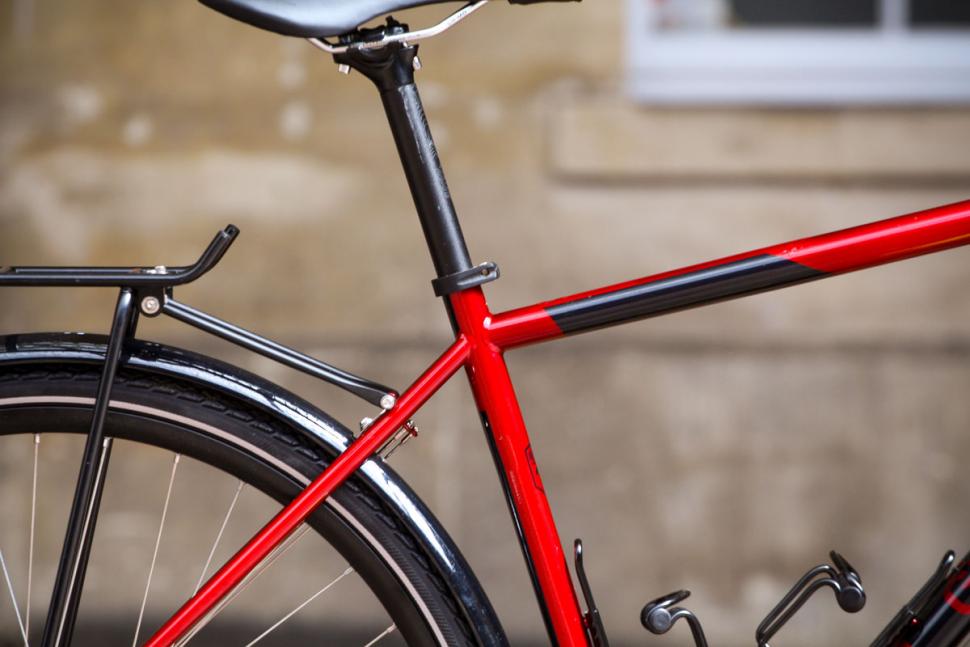
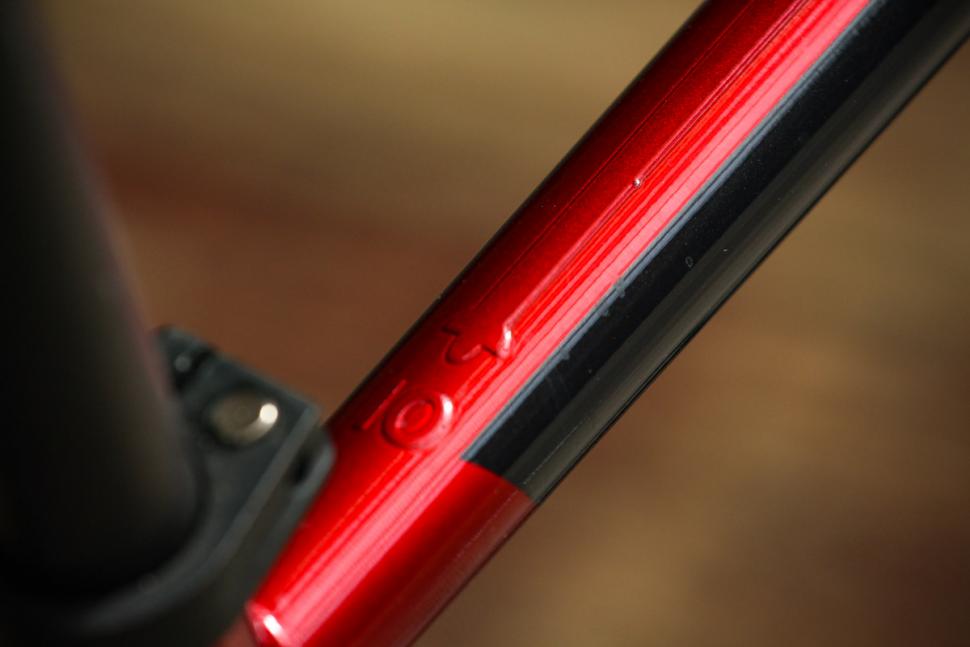
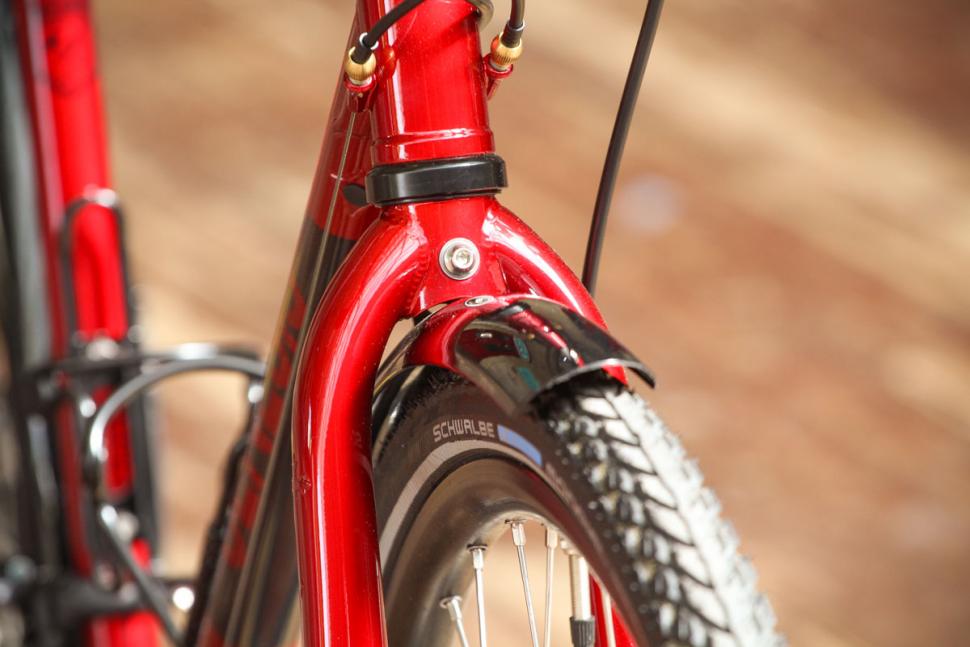
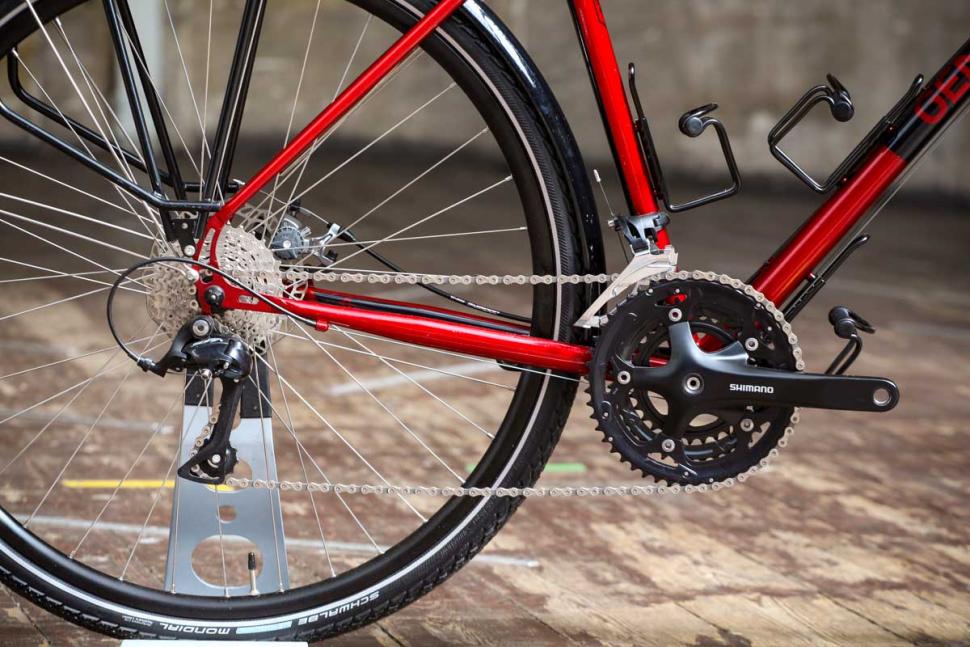
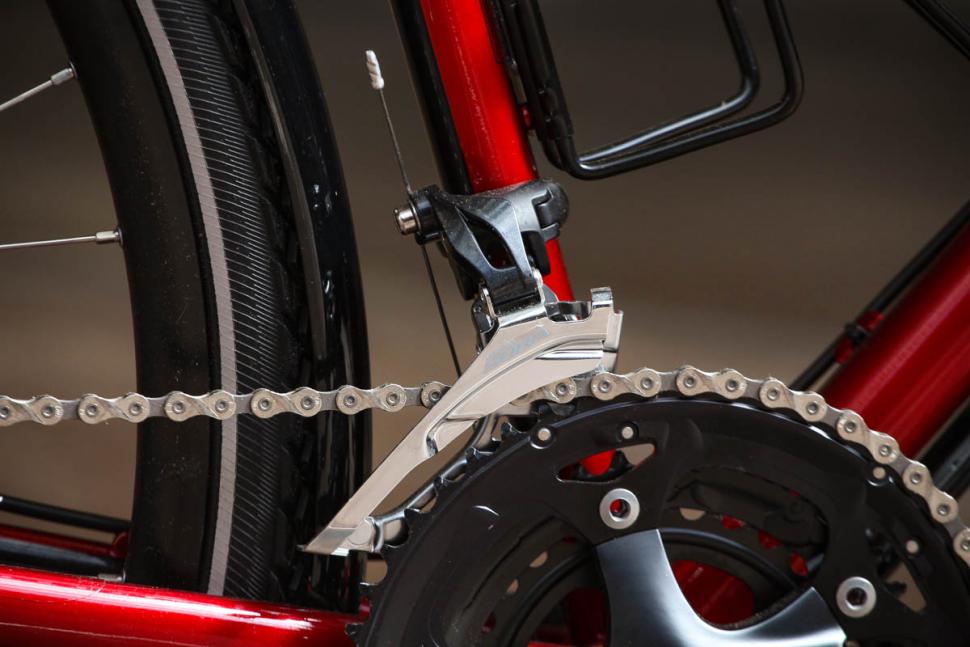
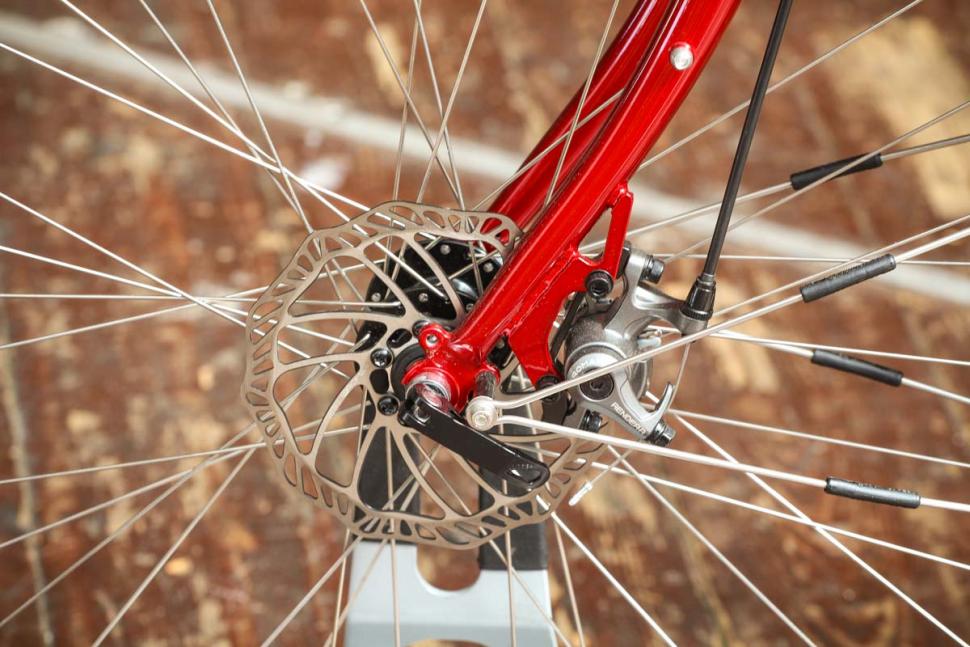
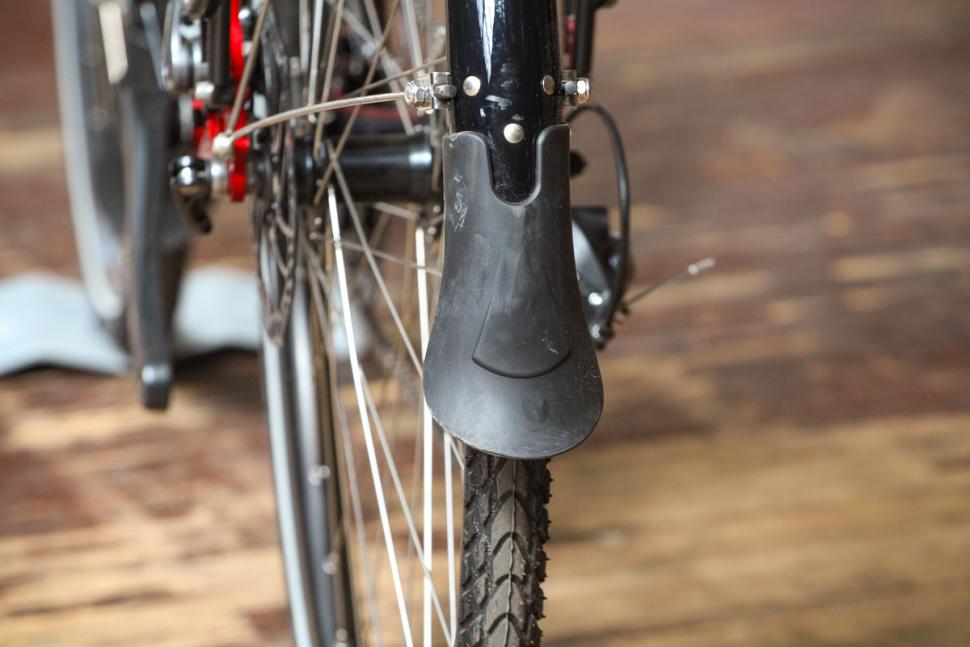
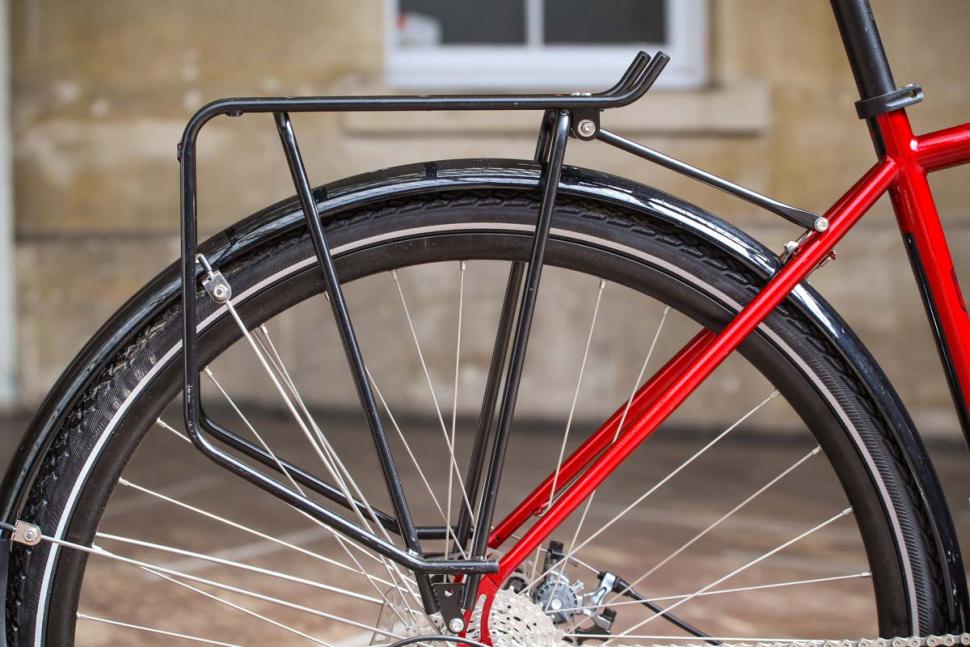
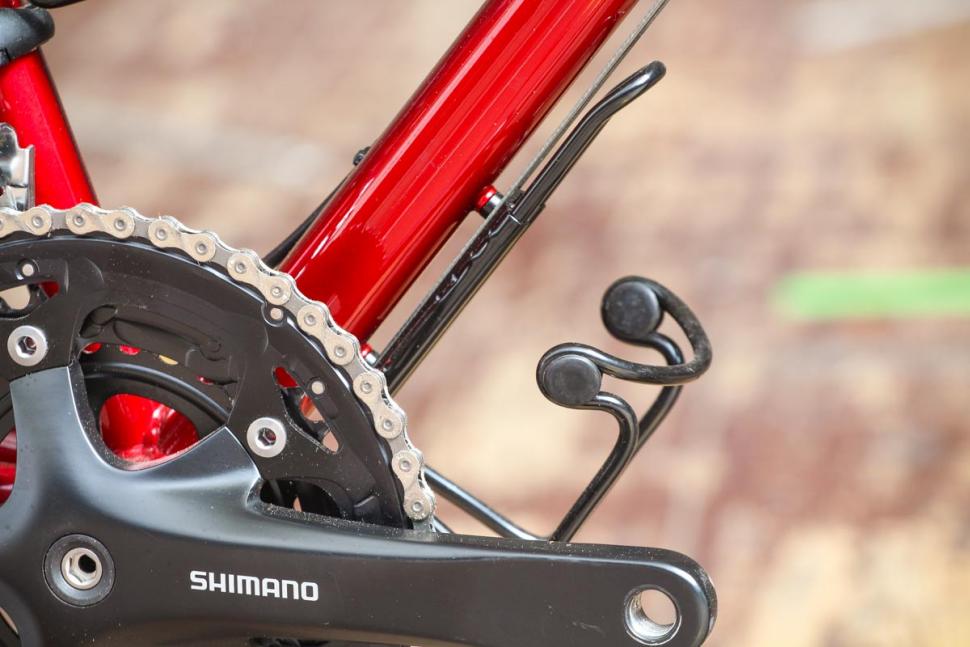
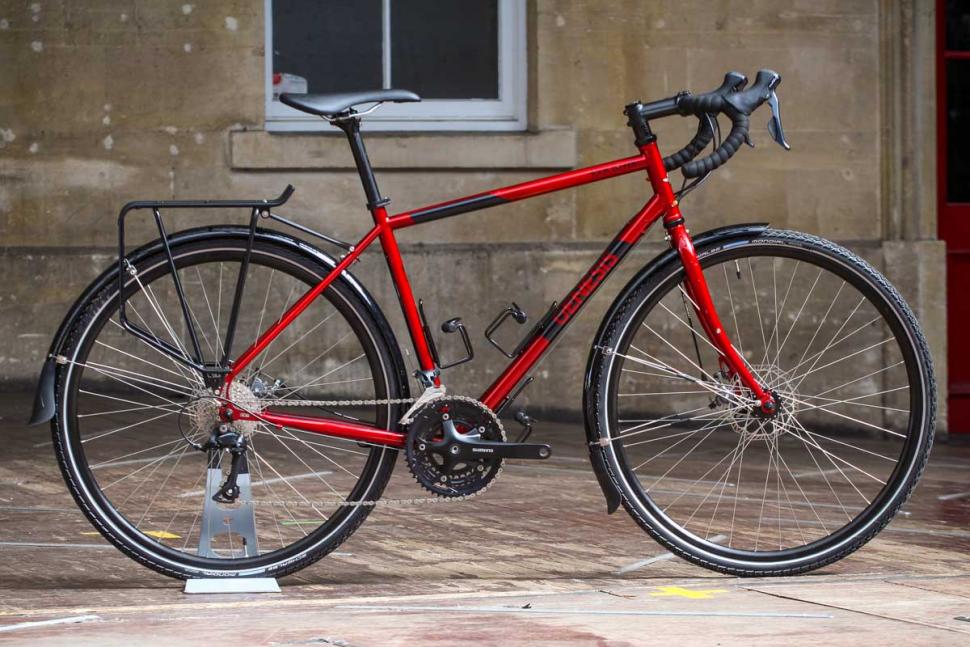
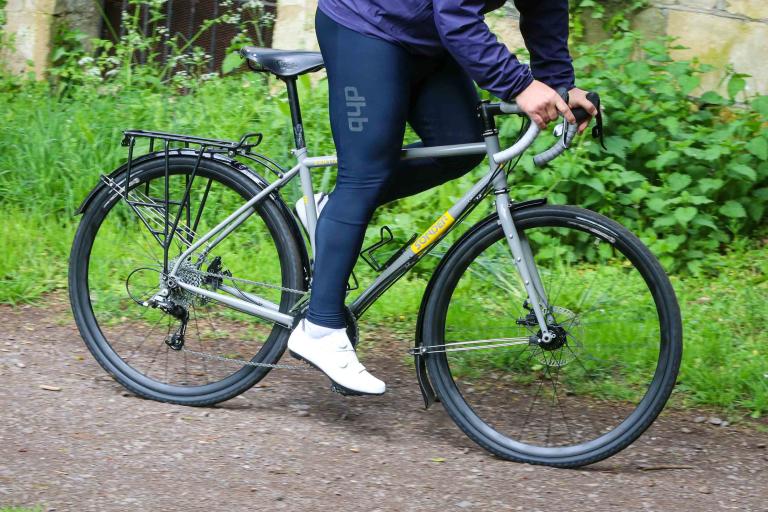
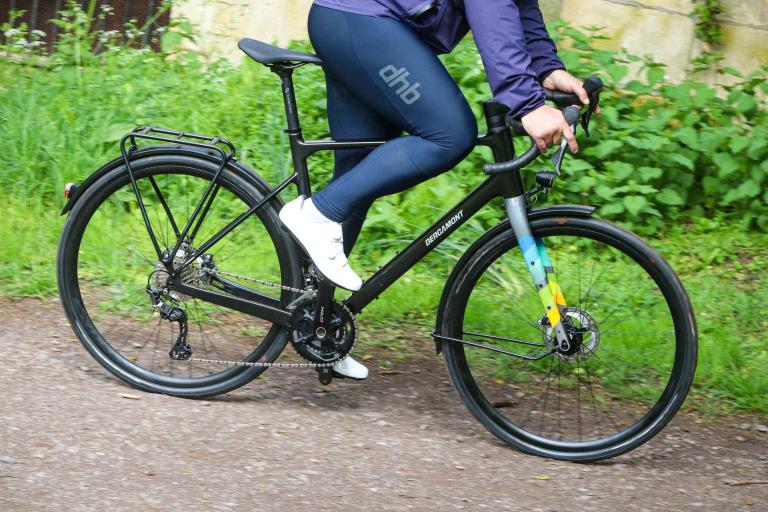
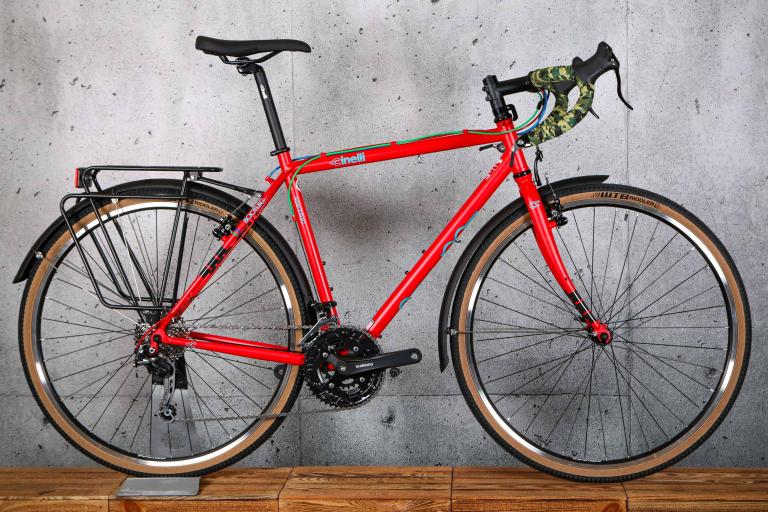
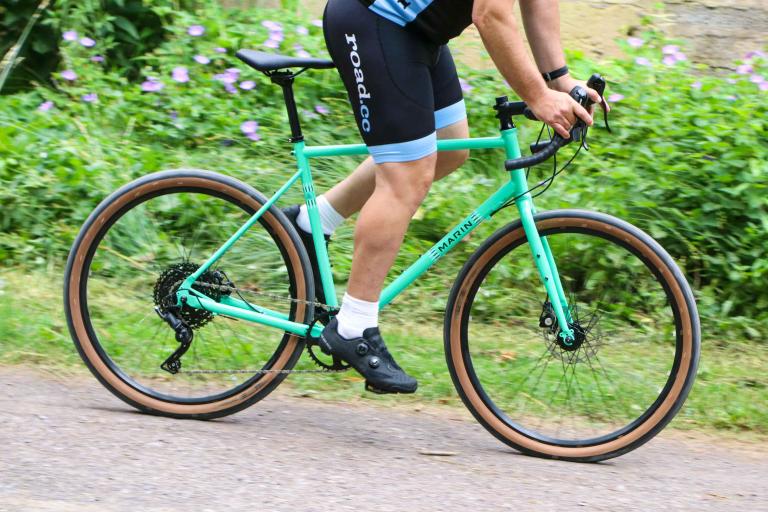
Add new comment
14 comments
Used to love genesis bikes but if you visit their website you will see they have lost the plot on pricing.
So, you can only ride it if you're worthy? Should help on theft-proofing it

Goodness, a bike with disks that isn’t the greatest Road.cc?
Have we now reached peak disk BS and can now talk constructively about how they have benefits and limitations in specific applications? Weird.
I built up a tourer for doing LEJOG around last year's frameset, the only difference being the tubes are Reynolds 725 rather than Mjolnir. The geometry is identical.
The comment around unloaded handling is spot on... When I was training, I took it up Great Fun Fell with just a rackpack and some Tangfastics on the back. It was fine going up, but scary coming down - 20% twisty bends at 40mph with the back end all over the shop was not fun. Theres some big drops off the edges of that road!
Loaded up though, the bike handles brilliantly. I did many fast descents with ease on it and while the steering might not be the fastest it is reassuringly stable.
I've got an earlier version of this bike when there was only one Tour De Fer model. It came with bar-end shifters, a trekking/MTB triple with a much more suitable gear range (44/32/22 rings with an 11-32 cassette) for fully loaded touring and both front and rear racks. Brakes were TRP Spyres which most people reckon are about the best cable discs going but I haven't been particularly impressed long-term. List price was IIRC £899 and was much better value for money than the TdF 10. To make it even better value I got it at the end of the season right before Genesis changed it to a flat-bar tourer. The current model's Sora equipment might be posher but IMHO not so relevant for a bike intended for loaded touring and bumps up the price.
Having said that, although I find the bar-end shifters great for on-road use they do make off-road riding a bit "interesting" sometimes. Like the reviewer I find the bike very stable at all times and would agree that loading it up seems to actually improve the handling a tad unlike tourers made of lighter gauge tubing. I also agree that the stock tyres aren't the most confidence inspiring when the roads are greasy and when I can find some 32mm Conti GP 4 Seasons at a reasonable price I'll stick some on for this winter.
As a multi-purpose machine for commuting and clubruns through the winter, touring or even "bikepacking" it's served me pretty well to be honest but I'm not sure I'd buy the TdF 10 at the current price.
The Trek 520 looks a bit better in some respects but as others have commented the aluminium fork would put me off. Why bother saving ~300g on a bike destined to be lugging loads of stuff around. There's no denying the 1.25kg Genesis fork is heavy and unyielding (no lovely steel spring in that beast) but at least I know it will take anything I throw it at.
Mark.
That's the thing though, despite the modern equipment this is still heavier than the old bog standard R531 Dawes Galaxy with racks/guards, it's 4kg heavier than my commuter/utility do-it-all hybrid with rack/guards/cages, it's heavier by over 3kg than a Roux Menthe with R525 with mudguards (no rack) and roughly the same as the Roux Etape 250 https://road.cc/content/review/82472-roux-etape-250-2013 which is still available for as low as £600. The Ridgeback Panorama is available for well under £1000 too.
If you don't think 4kg makes a difference when touring or commuting, go put two bricks in your panniers and come back to me.
As for forks, I find my 650g carbon mudguard forks (with low rider mounts too) will take everything I can throw at it includingcrashes and motor vehicles driving into them, why add more weight when it's not necessary nor compromise robustness and even be able to increase comfort?
You're not wrong there, it is ridiculously heavy! A lot of that comes from the stock tyres on mine which weigh roughly 1kg each and are far heavier than anything I ever put on my original 531 tourer BITD. That bike did some seriously laden touring but it was noticeably flexy when loaded up compared to the TdF. I also wouldn't have had the confidence to take it on the kind of off-road terrain that the TdF has done with me. That's not to say it wouldn't have survived as many an old member of the Rough Stuff Fellowship would probably tell me but that's my personal choice.
To compare it to the Roux Menthe is meaningless in the context of weight as they are made for different things. The equally heavy Roux Etape 250 is a proper comparison and as you say still around for much less money than the current TdF which as I've already aluded to isn't good value.
Looking around I can't find a disc-braked Panorama for well under £1000 although there are some of the rim-braked ones still available at those prices which again just reinforces what I said about getting good value by buying end-of-line bikes. I never would have paid £899 for my TdF but at £699 I considered it just about worth the money.
Your comment about 4kg made me laugh - where did I ever say 4kg doesn't make a difference? You'll get no argument from me there, I would love to save 4kg off my TdF if and only if every single component was to the same spec. So that means disc brakes, super tough 35mm tyres, 19mm rims, 36 spokes in each wheel, a steel frame with a stiff down tube to take the heavy touring loads etc. etc. I suspect that would be possible with a bigger budget than I had at the time I bought the bike but that's hardly the point.
Your carbon forks sound pretty tough, I'm not sure many forks would survive a direct hit from a motor vehicle no matter what they're made of. For some illogical reason I still prefer steel forks for every day riding and loaded touring, I can't defend it with facts I just don't have faith in carbon. I rode carbon-bladed forks with an aluminium crown and steerer in my Kinesis TK2 for years without worrying but that was only used for commuting. Eventually though I lost confidence in them when I noticed grooves in the fork crown made by the mudguard and started to see the join between the carbon and the aluminium. On the other hand the monocoque carbon forks in my "race" bike have my full confidence. As for the comfort factor neither of those carbon forks flex in the same way as steel does or soak up the vibration any better so for me I can't see where the comfort claims come from. Even with the unyielding TdF fork there's much more gain to be had from compliant tyres inflated to sensible pressures.
Getting back to the reviewed bike, yes it's not good value for money but seeing as you mentioned the Ridgeback Panorama the current disc-braked version is more expensive and even heavier (not that I think that matters) even with it's better quality 725 main tubes. So it's not like the TdF stands out like a sore thumb compared to what's currently being offered by manufacturers.
Out of interest what is your commuter/utility do-it-all hybrid? I think I've seen you mention it before but can't remember what it is.
Mark.
Pinnacle Dacite good option for £950? https://www.evanscycles.com/pinnacle-dacite-1-2019-touring-bike-EV318241, has TRP Spyres better than Promax, also a better gear range for properly fully loaded touring imo 44/32/22T up front and 11-34T on the back. I don't think the 30/32 on this is amazing when lugging panniers and tent and that. Also has the same great Tubus rack and better SKS guards. Bar end shifters though-if you can hack 'em.
Sora and Mechanical disks for £1200? Not the best value.
You can’t get hydraulics without going to 105, at which point you lose the triple. I suppose you could go to tiagra with hy/rd brakes, but that’s as close as you’d get.
Youre paying for the frame and the name, though, let’s be honest. My Genesis cost the thick end of £700 and that’s with rim brakes and no groupset at all.
Yeah good points. nice bikes, but the prices have creeped up lately for sure.
It's strange that the review says Genesis doesn't seem to represent the value it once used to. I'm not sure they've ever represented good value equipment-wise, which given that they spec Shimano components and their parent company is a Shimano distributor has always felt a little like price gouging to me.
A lack of power is not “a feature inherent to mechanical disc brakes”. I’ve got TRP Spyres with compressionless cables that will loosen the fillings in your teeth if you yank on them.
Now a lack of modulation is another matter, but you didn’t say that.
D
i agree, lack of power? Get a captain crush hand strengthener.